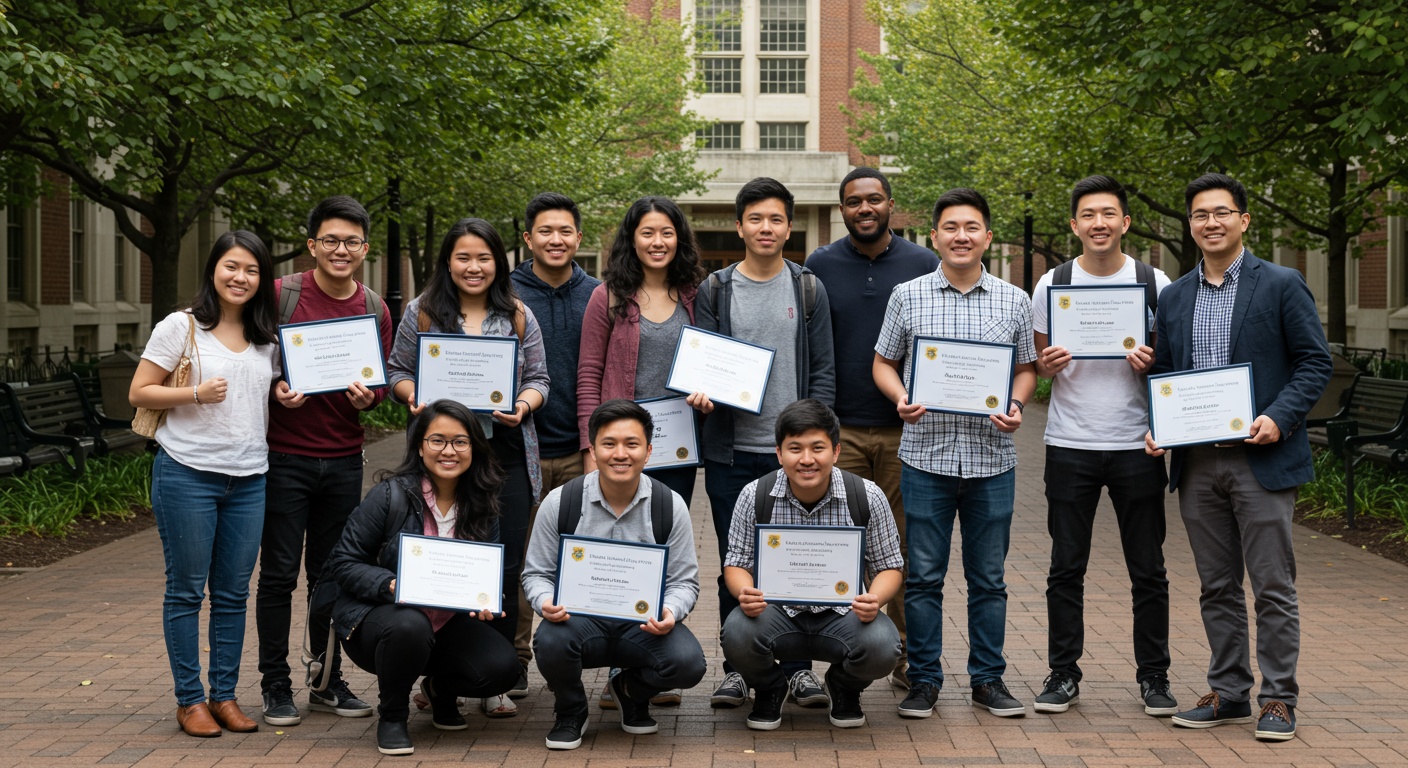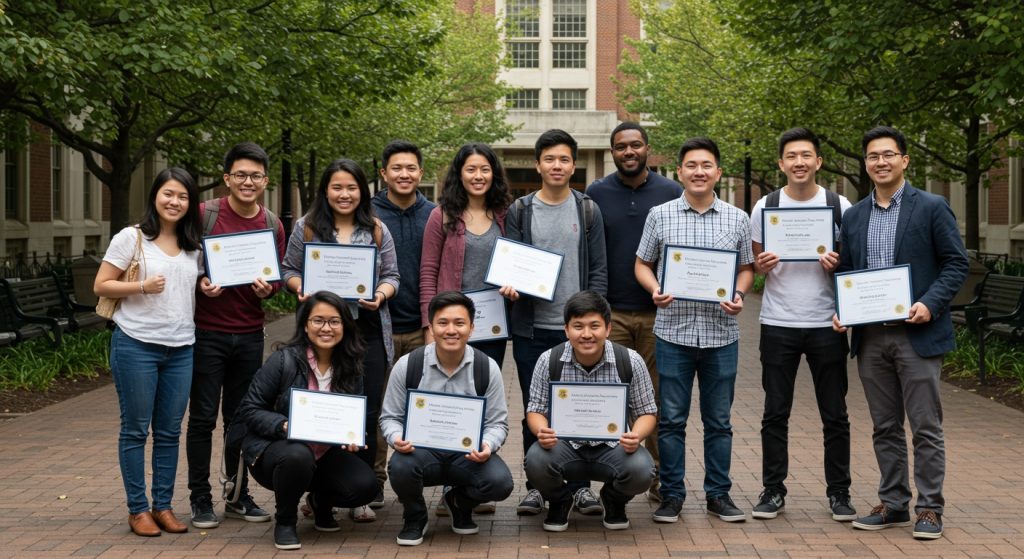Chasing a global education dream? The escalating costs of international tuition, averaging $40,000 annually in the US alone, can feel like an insurmountable barrier. But, universities worldwide are actively seeking diverse perspectives, evidenced by the 10% rise in merit-based scholarships offered to international students in the last year. This exploration dives into navigating the complex landscape of university scholarships. We’ll unpack strategies for identifying hidden opportunities, crafting compelling applications that showcase your unique potential beyond academic scores. Mastering the art of persuasive scholarship essays. Let’s transform your ambition into funded reality and unlock doors to world-class education.

Understanding the Scholarship Landscape for International Students
Navigating the world of university scholarships can feel like traversing a complex maze, especially for international students. To effectively seek financial aid, it’s crucial to first grasp the different types of scholarships available, the eligibility criteria. The overall application process. This foundational knowledge is the first step towards unlocking opportunities for global education. Scholarships generally fall into several categories:
- Merit-Based Scholarships: These are awarded based on academic excellence, outstanding achievements in extracurricular activities, or exceptional talent in a specific field. Universities often use standardized test scores (like the SAT or ACT) and grade point averages (GPAs) as primary indicators of merit.
- Need-Based Scholarships: These scholarships consider the applicant’s financial situation. They aim to provide access to education for students who might not otherwise afford it. Need is typically assessed through financial aid applications that detail income, assets. Family size.
- Country-Specific Scholarships: Many countries offer scholarships to students from specific regions or nations to promote cultural exchange and international relations. These scholarships might be funded by the government of the host country or by private organizations.
- Subject-Specific Scholarships: Some scholarships are earmarked for students pursuing particular fields of study, such as engineering, medicine, or the arts. These scholarships often target areas where there is a shortage of skilled professionals or where there is a strategic national interest.
- University-Specific Scholarships: Individual universities often have their own scholarship programs, funded by endowments, alumni donations, or institutional budgets. These scholarships can be highly competitive. They represent a significant source of funding for international students.
Understanding these categories allows students to target their search efforts and focus on scholarships for which they are most likely to be eligible.
Identifying Your Funding Needs: A Critical First Step
Before diving into scholarship applications, it’s essential to accurately assess your financial needs. This involves creating a detailed budget that encompasses all anticipated expenses, including tuition fees, accommodation costs, living expenses, health insurance, visa fees. Travel expenses. Many students underestimate the true cost of studying abroad, leading to financial strain later on. Consider using online resources like university cost of attendance calculators and international student budget templates to get a more realistic estimate. Once you have a clear understanding of your funding gap – the difference between your available resources and the total cost of education – you can prioritize scholarships that offer the most substantial financial support. This strategic approach maximizes your chances of securing adequate funding.
Where to Find Scholarship Opportunities: Unveiling the Resources
The search for scholarships can be overwhelming. Numerous resources are available to help international students. Here are some of the most effective avenues to explore:
- University Websites: Begin your search by thoroughly reviewing the financial aid and scholarship sections of the universities you are interested in attending. Most universities have dedicated pages outlining scholarship opportunities specifically for international students.
- Online Scholarship Databases: Websites like Scholarships. Com, InternationalStudent. Com. Fastweb. Com host vast databases of scholarships, grants. Fellowships. These platforms allow you to filter your search based on nationality, field of study. Academic level.
- Government Agencies: Many governments offer scholarships to international students as part of their foreign aid or cultural exchange programs. Check the websites of your home country’s ministry of education or foreign affairs for potential opportunities.
- Educational Advising Centers: Organizations like EducationUSA provide free educational advising services to students interested in studying in the United States. They can offer guidance on scholarship opportunities and the application process.
- Non-Profit Organizations: Many non-profit organizations and foundations offer scholarships to support students pursuing education in specific fields or from particular regions. Research organizations aligned with your academic interests and background.
- Professional Associations: If you are pursuing a specific professional field, such as engineering or business, check the websites of relevant professional associations. They often offer scholarships to students pursuing degrees in their respective fields.
Remember to verify the legitimacy of any scholarship provider before submitting an application. Be wary of websites that require you to pay a fee to access scholarship data or that guarantee scholarship awards.
Crafting a Compelling Scholarship Application: Showcasing Your Strengths
A well-crafted scholarship application is crucial for standing out from the competition. Here are some key elements to focus on:
- Academic Transcripts: Ensure that your academic transcripts are accurate, complete. Properly translated (if necessary). Highlight any exceptional grades or academic achievements.
- Standardized Test Scores: Submit your official test scores (SAT, ACT, TOEFL, IELTS, etc.) and ensure that they meet the minimum requirements for the scholarship. If your scores are not as high as you would like, consider retaking the test to improve your chances.
- Essays: Scholarship essays are your opportunity to showcase your personality, goals. Motivations. Write a compelling and original essay that answers the prompt thoughtfully and demonstrates your writing skills. Tailor each essay to the specific scholarship and highlight your unique qualities and experiences.
- Letters of Recommendation: Request letters of recommendation from teachers, professors, or mentors who know you well and can speak to your academic abilities, character. Potential. Provide your recommenders with ample time to write their letters and give them specific data about the scholarship and your goals.
- Extracurricular Activities: Highlight your involvement in extracurricular activities, volunteer work. Leadership roles. These activities demonstrate your well-roundedness, commitment. Ability to contribute to the university community.
It’s vital to proofread your application carefully for any errors in grammar, spelling, or punctuation. A polished and error-free application demonstrates your attention to detail and professionalism.
The Power of a Strong Essay: Telling Your Story
The scholarship essay is often the most crucial part of the application. It allows you to communicate your unique story, your aspirations. Your qualifications in a personal and engaging way. Here are some tips for writing a powerful scholarship essay:
- grasp the Prompt: Carefully read and interpret the essay prompt before you start writing. Make sure that you are addressing the specific questions or themes that the prompt is asking you to explore.
- Tell a Story: Use storytelling techniques to make your essay more engaging and memorable. Share personal anecdotes and experiences that illustrate your strengths, values. Motivations.
- Show, Don’t Tell: Instead of simply stating your qualities, provide specific examples that demonstrate them. For example, instead of saying that you are a hard worker, describe a time when you overcame a challenging obstacle through hard work and determination.
- Be Authentic: Write in your own voice and be authentic in your expression. Don’t try to be someone you’re not or to write what you think the scholarship committee wants to hear.
- Proofread Carefully: Before submitting your essay, proofread it carefully for any errors in grammar, spelling, or punctuation. Ask a friend, teacher, or mentor to review your essay and provide feedback.
Remember, the essay is your opportunity to make a lasting impression on the scholarship committee. Use it to showcase your unique qualities and to demonstrate why you deserve to receive the scholarship.
Navigating the Application Process: Tips and Strategies
The scholarship application process can be lengthy and demanding. Here are some tips and strategies to help you navigate it effectively:
- Start Early: Begin your scholarship search and application process well in advance of the deadlines. This will give you ample time to research opportunities, gather required documents. Write compelling essays.
- Create a Timeline: Develop a timeline that outlines all the key deadlines and milestones in the application process. This will help you stay organized and on track.
- Stay Organized: Keep track of all the scholarships you are applying for, the required documents. The application deadlines. Use a spreadsheet or a project management tool to stay organized.
- Follow Instructions Carefully: Read and follow the application instructions carefully. Failure to comply with the instructions can result in your application being disqualified.
- Submit a Complete Application: Ensure that you submit a complete application with all the required documents. Missing documents can delay or disqualify your application.
- Be Persistent: Don’t get discouraged if you don’t receive a scholarship on your first attempt. Be persistent and continue to apply for scholarships until you secure the funding you need.
Remember, securing scholarships requires effort, dedication. A strategic approach. By following these tips and strategies, you can increase your chances of success.
Understanding Education and Finance: The Connection
The intersection of education and finance is particularly critical for international students. Securing adequate funding is often the deciding factor in whether or not they can pursue their educational goals. Scholarship opportunities play a vital role in bridging the financial gap and making higher education accessible to talented individuals from around the world. Moreover, understanding personal finance principles is crucial for managing scholarship funds effectively. International students need to budget wisely, track their expenses. Make informed financial decisions to ensure that they can cover their living expenses and tuition fees throughout their studies. Universities often offer resources and workshops on financial literacy to help international students manage their finances effectively. Taking advantage of these resources can empower students to make sound financial decisions and to avoid unnecessary debt.
Real-World Success Stories: Inspiration and Motivation
Hearing success stories from other international students who have secured scholarships can be a powerful source of inspiration and motivation. These stories demonstrate that it is possible to overcome financial challenges and to achieve your educational dreams with hard work, perseverance. A strategic approach to scholarship applications. Many universities and scholarship providers feature success stories on their websites or in their publications. Reading these stories can provide valuable insights into the application process, the qualities that scholarship committees look for. The impact that scholarships can have on students’ lives. Consider reaching out to former scholarship recipients to learn from their experiences and to gain valuable advice. Networking with other international students can also provide support and encouragement throughout the scholarship application process.
Conclusion
Securing a global scholarship isn’t merely about academic excellence; it’s about presenting a compelling narrative of your potential impact. Remember the power of personalized applications. I once worked with a student from Ghana who, despite facing significant financial hardship, highlighted her volunteer work teaching coding to underprivileged children. Her passion shone through, ultimately landing her a full scholarship to a top US university. Don’t underestimate the importance of networking. Attend virtual university fairs and connect with current international students – their insights are invaluable. Also, be aware of emerging scholarship trends, like those focused on sustainable development or AI. Tailor your applications accordingly. The journey may seem daunting. With meticulous planning and a genuine display of your unique strengths, you can unlock the doors to a world-class education. Start today, believe in yourself. Remember that your potential knows no borders. For more on financing your education, explore student loan strategies.
More Articles
Navigating Repayment: Smart University Student Loan Strategies
Smart Money Moves: University Student Finance Tips And Tricks
Decoding University Tuition Fees: A Comprehensive Guide for Students
Fair Admissions: Ethical Considerations In University Funding And Acceptance
FAQs
So, what exactly are these ‘Global Scholars’ things I keep hearing about when it comes to scholarships?
Good question! ‘Global Scholars,’ generally speaking, refers to scholarship programs specifically designed to help international students afford university. Think of them as funding opportunities that recognize talent and potential from all over the world, aiming to diversify the student body at universities, primarily in countries like the US, UK, Canada. Australia.
Okay, that makes sense. Are these scholarships just for super geniuses or something?
Not at all! While excellent grades are definitely a plus, most Global Scholars programs look at a much wider range of things. They consider your leadership skills, your involvement in extracurricular activities, your passion for your field of study. Even your life experiences. They’re looking for well-rounded individuals who will contribute positively to the university community.
What kind of expenses do these scholarships usually cover? Tuition only, or more?
It varies a lot! Some scholarships are ‘full-ride,’ meaning they cover tuition, room and board, books. Even living expenses. Others might cover just tuition, or a percentage of tuition. Always check the specifics of each scholarship to see what’s included – the devil’s in the details, as they say!
This all sounds great. Where do I even begin looking for these scholarships?
That’s the million-dollar question! Start by checking the websites of universities you’re interested in. They often have dedicated sections for international student funding. Also, explore websites like InternationalScholarships. Com and EducationUSA. Org. Don’t be afraid to Google ‘[Your Country] + Scholarships for Studying Abroad’ either – you might be surprised what you find!
What are some common mistakes international students make when applying for these scholarships?
One of the biggest is not paying close attention to the eligibility requirements and application deadlines! Also, many students write generic essays that don’t really showcase their personality or unique experiences. Tailor your application to each scholarship, highlighting why you’re a good fit for that specific program.
Are these scholarships only for undergraduate degrees, or can I find them for graduate studies too?
You can definitely find scholarships for graduate studies as well! In fact, there are often more funding opportunities available at the graduate level, especially for research-based programs. So, if you’re planning on pursuing a Master’s or PhD, definitely start your scholarship search early!
Any last-minute tips for someone just starting their scholarship hunt?
Absolutely! Be persistent, be organized. Don’t be afraid to ask for help. Talk to your teachers, your guidance counselor, or even alumni who have studied abroad. And most importantly, believe in yourself! The application process can be long and challenging. It’s definitely worth the effort.



